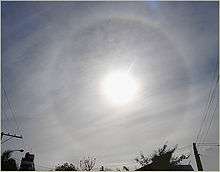halo
English

Etymology
From Latin halōs, from Ancient Greek ἅλως (hálōs, “disk of the sun or moon; ring of light around the sun or moon; threshing floor with its surrounding threshold; disk of a shield”); itself of unknown origin, see هلال and תהילה. Used in English since 1563, sense of light around someone’s head since 1646.
Noun
- A circular band of coloured light, visible around the sun or moon etc., caused by reflection and refraction of light by ice crystals in the atmosphere.
- (astronomy) A cloud of gas and other matter surrounding and captured by the gravitational field of a large diffuse astronomical object, such as a galaxy or cluster of galaxies.
- Anything resembling this band, such as an effect caused by imperfect developing of photographs.
- (religion) nimbus, a luminous disc, often of gold, around or over the heads of saints, etc., in religious paintings.
- The metaphorical aura of glory, veneration or sentiment which surrounds an idealized entity.
- (medicine) A circular brace used to keep the head and neck in position.
Derived terms
- halo effect
- halo nucleus
- neutron halo
- nuclear halo
- proton halo
Translations
|
|
|
|
Verb
halo (third-person singular simple present haloes, present participle haloing, simple past and past participle haloed)
- (transitive) To encircle with a halo.
Related terms
Translations
References
- Webster's Seventh New Collegiate Dictionary, Springfield, Massachusetts, G.&C. Merriam Co., 1967
- “halo” in Douglas Harper, Online Etymology Dictionary, 2001–2019.
Breton
Catalan
Cebuano
Alternative forms
Pronunciation
- Hyphenation: ha‧lo
Etymology
For the second noun sense, the monitor lizard's timidity likened to cowardice.
Danish
Dutch
Etymology
From Latin halos, from Ancient Greek ἅλως (hálōs, “disk of the sun or moon, ring of light around the sun or moon; threshing floor; disk of a shield”), itself of unknown origin.
Pronunciation
- IPA(key): /ˈɦaː.loː/
Audio (file)
Noun
halo m (plural halo's, diminutive halootje n)
- halo (atmospheric phenomenon).
- Similar visual effect resulting from undesirable, roughly circular spots on an imperfectly developed photograph.
References
- M. J. Koenen & J. Endepols, Verklarend Handwoordenboek der Nederlandse Taal (tevens Vreemde-woordentolk), Groningen, Wolters-Noordhoff, 1969 (26th edition) [Dutch dictionary in Dutch]
Esperanto
Pronunciation
Audio (file)
- IPA(key): /ˈhalo/
- Hyphenation: ha‧lo
- Rhymes: -alo
Finnish
Pronunciation
- Rhymes: -ɑlo
Etymology 1
Verb
halo
Etymology 2
Declension
| Inflection of halo (Kotus type 1/valo, no gradation) | |||
|---|---|---|---|
| nominative | halo | halot | |
| genitive | halon | halojen | |
| partitive | haloa | haloja | |
| illative | haloon | haloihin | |
| singular | plural | ||
| nominative | halo | halot | |
| accusative | nom. | halo | halot |
| gen. | halon | ||
| genitive | halon | halojen | |
| partitive | haloa | haloja | |
| inessive | halossa | haloissa | |
| elative | halosta | haloista | |
| illative | haloon | haloihin | |
| adessive | halolla | haloilla | |
| ablative | halolta | haloilta | |
| allative | halolle | haloille | |
| essive | halona | haloina | |
| translative | haloksi | haloiksi | |
| instructive | — | haloin | |
| abessive | halotta | haloitta | |
| comitative | — | haloineen | |
Derived terms
- haloilmiö
French
Etymology
From Latin halos, from Ancient Greek ἅλως (hálōs, “disk of the sun or moon, ring of light around the sun or moon; threshing floor; disk of a shield”), itself of unknown origin.
Pronunciation
- (aspirated h) IPA(key): /a.lo/
Noun
halo m (plural halos)
- Halo (atmospheric phenomenon)
- Similar visual effect resulting from undesirable, roughly circular spots on an imperfectly developed photograph.
References
- Nouveau Petit Larousse illustré. Dictionnaire encyclopédique. Paris, Librairie Larousse, 1952, 146th edition
Further reading
- “halo” in le Trésor de la langue française informatisé (The Digitized Treasury of the French Language).
Galician
Indonesian
Latin
Etymology
Possibly a denominative verb from Proto-Indo-European *h₂enh₁-s-lo- (with spurious h), from *h₂enh₁- (“to breathe”), whence animus.[1]
Pronunciation
- (Classical) IPA(key): /ˈhaː.loː/, [ˈhaː.ɫoː]
Verb
hālō (present infinitive hālāre, perfect active hālāvī, supine hālātum); first conjugation
- breathe
- emit, exhale, release (gas or fragrance)
- be fragrant
- P. Vergilius Maro, Aeneid, Book I, ll. 416 ff.
- Ipsa Paphum sublimis abit sedesque revisit
Laeta suas ubi templum illi centumque Sabaeo
Ture calent arae sertisque recentibus halant- [Venus] goes flying back to Paphos and sees happily again her seat
Where there is a temple to her and a hundred altars
That warmly glow with Sheban incense and are perfumed by fresh wreaths.
- [Venus] goes flying back to Paphos and sees happily again her seat
- Ipsa Paphum sublimis abit sedesque revisit
- P. Vergilius Maro, Aeneid, Book I, ll. 416 ff.
Inflection
References
- halo in Charlton T. Lewis and Charles Short (1879) A Latin Dictionary, Oxford: Clarendon Press
- halo in Charlton T. Lewis (1891) An Elementary Latin Dictionary, New York: Harper & Brothers
- halo in Gaffiot, Félix (1934) Dictionnaire Illustré Latin-Français, Hachette
- Pokorny, Julius (1959) Indogermanisches etymologisches Wörterbuch [Indo-European Etymological Dictionary] (in German), Bern, München: Francke Verlag
Norwegian Bokmål
Norwegian Nynorsk
Polish
Pronunciation
- IPA(key): /ˈxa.lɔ/
audio (file)
Etymology 2
From Ancient Greek ἅλως (hálōs).
Declension
Indeclinable.
Etymology 3
Portuguese
Noun
halo m (plural halos)
Serbo-Croatian
Etymology 1
Spanish
Noun
halo m (plural halos)